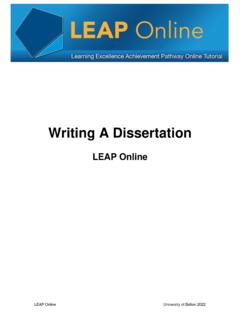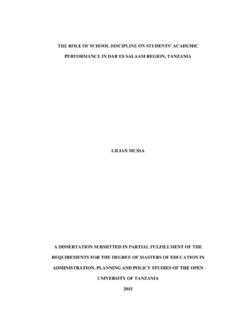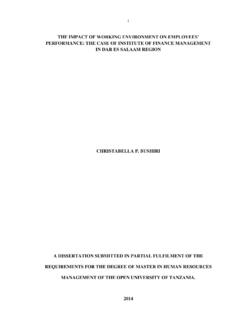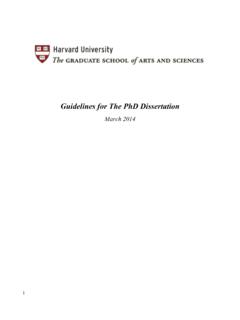Transcription of Mother Tongue-Based Multilingual Education in the ...
1 Mother Tongue-Based Multilingual Education in the Philippines: Studying Top-Down Policy Implementation from the Bottom Up A dissertation submitted TO THE FACULTY OF UNIVERSITY OF MINNESOTA BY Lisa Ann Burton IN PARTIAL FULFILLMENT OF THE REQUIREMENTS FOR THE DEGREE OF DOCTOR OF PHILOSOPHY Dr. David W. Chapman, Adviser May 2013 Lisa Ann Burton 2013 i Acknowledgements My journey toward a has come to an end. As I reflect back on the last several years, I am amazed by the countless learning opportunities that have occurred along the way. Each experience was enhanced by the individuals I encountered and made possible by the support of so many others. My words cannot adequately address the contributions of these important people in my life. My adviser, Dr.
2 David Chapman, has been an instrumental part of my graduate school career. Having traveled together on four separate trips to Uganda and India, I had the privilege of learning from him in the field as well as working together back home. He challenged me in constructive ways and served as the voice of reason on many occasions. I have grown as a person and as a researcher through my interactions with him. I am also deeply thankful for the rest of my committee members: Dr. Frances Lawrenz, Dr. David Johnson, and Dr. Chris Johnstone. Each has graciously contributed valuable insights and feedback into my dissertation work and professional development. Dr. Joan DeJaeghere deserves special mention for the countless hours she worked with me to conceptualize my dissertation . I am continually amazed by her seemingly endless energy and desire to make a difference in this field.
3 I am also indebted to Dr. Kendall King who helped me see the larger picture of language policy beyond my individual study. I was blessed at the University of Minnesota to receive graduate assistantships with two remarkable scholars and mentors: Dr. Heidi Barajas and Dr. Andrew Furco. Heidi introduced me to the world of qualitative research and always made me feel like the most important person in the world when I was with her. Andy challenged me to grow as a quantitative researcher and always emphasized that I was working with him rather than for him. I am thankful to have these two individuals in my corner! I have been fortunate to cross paths with many remarkable people since beginning graduate school. I hope my work with them continues far into the future. These include Catherine Young, Diane Dekker, Ricardo Nolasco, Carol Benson, and Kimmo Kosonen who have all provided me valuable information about MTB-MLE.
4 Shirley Miske and Jean Strait have also played a major supporting role through their encouragement and understanding of the immensity of this task. In addition, many friends have offered listening ears and pulled me away from my computer to take needed breaks. The field work for my dissertation was made possible through the Mary Corcoran Endowed Fellowship for Evaluation and Policy Studies at the University of Minnesota. As part of that field work, I was privileged to work with three important women in the design and implementation of my study. Yolanda Sims graciously helped me translate my surveys and information sheets into Tagalog prior to my data collection. Gina Pantino, a DepEd division supervisor, granted me access to schools and provided valuable background knowledge on MTB-MLE. Melissa Aguila, my invaluable research assistant, ii spent long hours helping me execute an ambitious research plan in a short timeframe.
5 I count all of these women as lifelong friends. In addition, I thank the Dela Providencia and Due a families who provided me a place to stay, wonderful meals, and great conversation. I look forward to many return visits. There are several others in the Philippines who deserve credit for this dissertation , including the teachers and parents to whom I spoke and from whom I learned. Through each conversation I learned how much they care about the students in their schools and the children in their families. Despite the challenges presented in their lives, it is inspiring to know that their hope for the future does not fade. Most of all, I am eternally grateful for my family. In 1994, I sat at my high school graduation wondering why so many thanks were being showered on the parents. As a na ve eighteen year old, I did not realize that milestones are not achieved alone but with the support of others.
6 My parents, Bill and Darline Mahowald, are the only people in the world that have been with me since day one. They have never left my side, even when I failed to see them there. I am eternally grateful for all they have done, and I only hope I can give to others as they have given to me. My children, Luke and Darcy, have been rays of light in this dissertation process. Their smiles and squeals of laughter brought immense joy to me amidst my writing, and I could always count on them to lighten my mood when I was starting to think too much. I count myself lucky to have had dissertation breaks that included dance parties, wrestling matches, and lots of hugs. To my five year old, who has continually asked when my book would be finished, I can finally say it s over! I have saved the most important person in my world for last--my dear husband Robert Burton.
7 He has given just as much as I have to make this dissertation a reality. His advice, encouraging words, and gentle pushes were often the only reasons I kept working. When I was paralyzed from the fear of this task, he could somehow bring me to life again. I am in awe of the patience he displayed and the sacrifices he made to allow me this opportunity. I know I could not have done this without him. It is for these reasons that I share the honor of this with him. iii Dedication To my husband and best friend Robert Burton You are the unsung hero of this process. Others may never know the extent of your support. I will always remember. iv Abstract There is a growing trend around the world to support Mother tongue instruction in the early years of a child s Education . In Southeast Asia, this is apparent in a rising number of educational programs that utilize this approach.
8 However, the Philippines is the only country in Southeast Asia to have instituted a national policy requiring Mother Tongue-Based Multilingual Education (MTB-MLE) in the primary school years. While studies have long supported the use of Mother tongue as the language of instruction, they have primarily been conducted in community rather than national settings. As such, little is known about how a national policy for MTB-MLE can be disseminated into contextualized local environments. This study examined how teachers and parents in one school district in the Philippines understand and enact MTB-MLE. Teachers and parents knowledge, beliefs, and practices were studied to identify how national language policy is appropriated at the ground level. In addition, the challenges to policy implementation were explored and analyzed.
9 Utilizing a case study methodology, this research included focus groups, surveys, classroom observations, and individual interviews. Data were collected during a three week time period in June and July 2012, which was one month after the beginning of MTB-MLE implementation in the schools. Results from this study indicated that teachers and parents views of MTB-MLE focused on the short-term benefits of the policy and the long-term disadvantages. While both groups were overwhelmingly satisfied with the increase in student understanding, they expressed concern about the future implications for learning in Bikol rather than in v English. They overtly supported the policy in terms of complying with the requirements, yet covert resistance was observed in their words and actions. The implications of these findings revolve around the way in which language policy is managed.
10 Rather than a top-down approach that does not consider the local context, language policy must be implemented through interactions between the top and the bottom. vi Table of Contents List of Tables .. viii List of Figures .. ix CHAPTER I: INTRODUCTION .. 1 Problem Statement .. 5 Purpose of the Study .. 7 Significance of the research .. 8 Definitions and Terminology .. 10 Background: Language Policy in the Philippines .. 13 CHAPTER II: LITERATURE REVIEW .. 20 Theoretical Frameworks .. 20 Mother Tongue-Based Multilingual Education .. 25 Language Beliefs and Ideology .. 30 Language Management .. 35 Language Practices .. 40 CHAPTER III: METHODOLOGY .. 45 Research 45 Research Site and Participants .. 47 Data Collection .. 52 Data Analysis .. 59 Quality Criteria .. 62 Limitations .. 64 CHAPTER IV: RESULTS.





